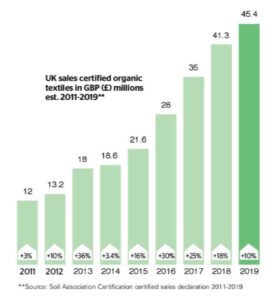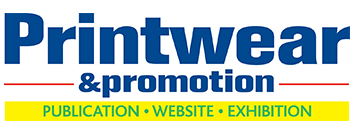 The Soil Association has released its latest report on the organic textile market in the UK and the findings reveal that the sector is experiencing its eighth year of consecutive growth.
The Soil Association has released its latest report on the organic textile market in the UK and the findings reveal that the sector is experiencing its eighth year of consecutive growth.
The UK organic market (including food, drink, beauty and wellbeing, textiles and farming) is in its eighth consecutive year of growth, and the organic textiles market outperformed the market in 2019.
However, there is huge potential for more growth now that there is more organic cotton in circulation. There are more facilities certified to the Global Organic Textile Standard (GOTS) and the Organic Content Standard (OCS), and increased consumer demand.
UK sales of Soil Association certified textiles to GOTS and OCS increased in 2019, rising by 10% to £45.4 million. Clothing makes up 44% of total sales, an increase of 14%, and is worth £16.5 million.
Brands such as Frugi, People Tree and Seasalt – that have a longstanding commitment to organic – continue to grow. However, there is still plenty of potential for certified organic fashion to become mainstream. The homeware market, which features organic bedding and mattresses, is the fastest growing sector, with a 17% increase in sales.
There is a significantly growing consumer demand for sustainable fashion. Nearly nine out of 10 people want the fashion industry to be more sustainable, according to e-commerce platform, Nosto. ‘Organic cotton’ as an online search rose 52% in 2019 (Lyst), and when Soil Association Certification ran a campaign on organic cotton in October 2019, traffic to the association’s organic fashion pages increased by 130%.
Availability is less of a barrier
Organic cotton has become more accessible to UK shoppers – greater consumer demand and better availability of organic cotton being the top two reasons why they would do so. There has been a 127% increase in the number of products in the UK sold as organic cotton since 2017, according to a 2019 report from retail technology company, EDITED.
 Latest statistics show more availability of certified organic cotton to UK companies. This is important because brands and retailers say that availability and cost are the top two barriers to sourcing sustainable fibres at scale (McKinsey Apparel Chief Purchasing Officer Survey 2019). Textile Exchange’s Organic Cotton Market Report 2019 found that organic cotton production had risen 56% in 2016/17 to be the highest it’s been in eight years.
Latest statistics show more availability of certified organic cotton to UK companies. This is important because brands and retailers say that availability and cost are the top two barriers to sourcing sustainable fibres at scale (McKinsey Apparel Chief Purchasing Officer Survey 2019). Textile Exchange’s Organic Cotton Market Report 2019 found that organic cotton production had risen 56% in 2016/17 to be the highest it’s been in eight years.
Meanwhile, GOTS-certified facilities increased by 35% and OCS-certified facilities are up 16%.
Public commitments are helping
A total of 12 key UK-based brands have now committed to sourcing 100% of their cotton from sustainable sources by 2025. Ted Baker, New Look and Next are among the UK brands who joined the 2025 Sustainable Cotton Challenge in 2019, to which 59 global brands are committed. Part-instigated by the Soil Association, the initiative encourages the continuous improvement of cotton sourcing towards organic. Since ASOS committed to the challenge in 2017, the brand has increased its number of organic cotton products by over 500%.
For the organic market to thrive, UK shoppers need to better understand that the way textiles are produced makes a difference. Soil Association Certification 2019 research found that while 39% of UK shoppers care about the environment, it’s never occurred to them that their clothes might have an impact on it. Less than a third (32%) of people in the UK check what an item is made of before they make a purchase, but more than half (54%) are concerned about the use of chemicals in clothing. This is a great opportunity for GOTS-certified products, made only using low impact inks and dyes.
Conclusion
The time for organic is now. Momentum is building, but progress is slow and we are running out of time.
Only 1% of global cotton is organic – so there’s plenty more progress that needs to be made in this channel. ‘Preferred cotton’ is cotton that is made sustainably and more equitably for farmers. A total of 19% of global cotton is now preferred, 3% of which is organic (Textile Exchange’s Organic Cotton Market Report 2019). Organic at scale requires time and commitment. This is why multi-stakeholder organisations, like the Organic Cotton Accelerator, are capacity building through training farmers and increasing the availability of organic cotton seed (80% of cotton seed is genetically modified).
Beyond sourcing, there is a marketing opportunity – and an urgent need – for brands and retailers to empower their customers to be citizens of the planet.
This includes:
- Being curious and informed about what’s on labels.
- Making fewer, but better purchases, such as organic.
- Taking citizenship action beyond just purchasing a product.
Soil Association Certification will help organic businesses to deliver on this through marketing platforms like Organic September. GOTS and OCS logos will remain vital signals that organic sourcing claims can be backed up.
 Printwear & Promotion The Total Promotional Package
Printwear & Promotion The Total Promotional Package




